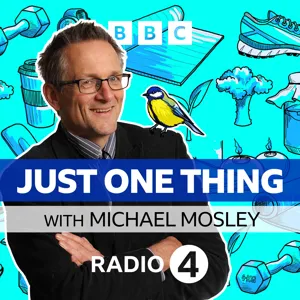Podcast Summary
Find an enjoyable form of exercise to maintain health: Staying active through preferred exercise boosts physical and mental well-being, preventing or delaying diseases and enhancing mood, coping skills, and social connections.
Regular exercise is essential for maintaining both physical and mental health. Professor Marie Murphy, an expert in physical activity for health, emphasizes the importance of staying active to prevent or delay major diseases and improve mood, coping abilities, and social connections. However, many people struggle to find an enjoyable form of exercise or view it as a chore rather than a benefit. To overcome this, it's crucial to find a physical activity that suits personal preferences and reframes exercise as a positive experience rather than a punishment.
Incorporating Vigorous Activity into Daily Life: Adding short bursts of vigorous activity to your daily routine can be as effective as continuous exercise for health benefits. Find opportunities to take stairs, cycle uphill, or other activities to make exercise a habit.
Incorporating short bursts of vigorous physical activity into your daily life can be an effective way to make exercise a habit and reap health benefits. This approach, known as VIGorous Intermittent Lifestyle Physical Activity (VILPA), involves finding opportunities to add vigorous activity to your routine, such as taking the stairs instead of the elevator or cycling uphill on your commute. Research suggests that breaking up continuous exercise into shorter bouts throughout the day can be just as beneficial, and even small amounts of physical activity add up over time. Architects and building designers can also help make stairs more accessible and inviting to encourage their use. The key is to make physical activity a regular part of your life, as habitual as brushing your teeth, and to find ways to make it fit seamlessly into your daily routine. As professor Steve Blair, a renowned researcher in the field, once said, "The best form of exercise is the one you'll keep doing every day."
Short bouts of exercise can boost metabolism and flexibility: Short exercise sessions can increase metabolism multiple times a day, leading to higher energy expenditure. Missing a short bout doesn't mean missing out on the entire session, allowing for more opportunities to exercise.
Short bouts of exercise may have advantages over longer sessions when it comes to boosting metabolism and flexibility in fitting exercise into a busy lifestyle. The discussion highlights that short exercise sessions can increase metabolism multiple times a day, leading to higher energy expenditure. Additionally, missing a short bout doesn't mean missing out on the entire exercise session, allowing for more opportunities to make up for missed time. The speaker's personal background in sports and education led them to a career in researching the benefits of physical activity and finding ways to make it accessible to everyone. Despite the widespread recommendation of 30 minutes of moderate to vigorous activity daily, a significant portion of the population is not meeting these guidelines. As we age, it's essential to focus on maintaining muscle strength through resistance exercises, as outlined in the physical activity guidelines.
Maintaining muscle strength is crucial for living an independent life as we age: Simple exercises like squats and daily habits can help maintain muscle strength, improve joint movement, increase blood flow to the brain, and challenge the cardiovascular system.
As we age, maintaining muscle strength becomes increasingly important for living a long and independent life. Many people neglect muscle strengthening exercises, which can lead to a decrease in physical function and the need for care. Simple exercises like squats, which work on the biggest muscles in the body, can help maintain strength, improve joint movement, increase blood flow to the brain, and challenge the cardiovascular system. Making muscle strengthening exercises a daily habit, such as doing press ups, squats, and lunges every morning, can help keep the body strong and functional. Even small efforts, like standing up and sitting down during commercials, can add up to significant improvements in muscle strength and overall health.
Maintaining Muscle Mass with Resistance Training: As we age, focusing on muscle health through resistance training can help maintain mobility, balance, burn calories, and aid in weight management and blood sugar control. Simple exercises using body weight or everyday items can be effective.
As we age, our muscle mass naturally declines, but it's never too late to build and maintain muscle through resistance exercises. You don't need a gym or fancy equipment; using your own body weight or everyday items can be effective. Building muscle not only helps maintain mobility and balance, but it also acts as a metabolic furnace, burning more calories and aiding in weight management and blood sugar control. So, along with aerobic activities, incorporate resistance training into your routine for a healthier, more active aging process. Michael Mosley, in his podcast "Just One Long Thing," discussed this topic with Professor Marie Murphy, emphasizing the importance of focusing on muscle health and the various ways to incorporate resistance exercises into daily life. Mosley, an avid runner, shared his personal enjoyment of running and the sense of accomplishment he feels after completing a challenging session.
Find a physical activity you enjoy to make it a habit: During the pandemic, encourage a 'home to home commute' for exercise and find a form of physical activity you enjoy to make it a consistent part of your routine, as both running and brisk walking offer similar health benefits.
Finding an enjoyable form of physical activity is crucial for making it a consistent part of your life. While some people may enjoy running, others might prefer brisk walking. Regardless of the activity, the key is to find what you enjoy and make it a habit. Running and brisk walking offer similar health benefits, but running may not be suitable for everyone due to its impact on the body. During the pandemic, many people have been working from home and reducing their physical activity. To encourage more activity during work hours, consider implementing a "home to home commute" by walking or doing another form of exercise before starting work. The most important thing is to find a physical activity that you enjoy and make it a regular part of your routine.
Incorporate physical activity into your daily routine at home: Set reminders, create an 'artificial commute', focus on benefits, drink water, take stairs, walk when possible.
To maintain physical activity while working from home, it's essential to incorporate it into your daily routine creatively. This could mean setting reminders to stand up and move around, creating an "artificial commute," or finding activities you enjoy. Avoid viewing exercise as a form of punishment or solely for weight loss. Instead, focus on the mental and physical benefits it brings. Additionally, remember to drink plenty of water, take the stairs instead of elevators, and walk when possible. By making these adjustments, you can effectively replace the physical activity lost from commuting to an office.
Making Exercise Enjoyable: Approach exercise positively, focus on enjoyment and benefits, try new activities, and make it a lifelong habit.
Approaching exercise with a negative mindset, focusing solely on calorie burning and weight loss, can lead to disappointment. Instead, make exercise enjoyable by finding activities that give you a buzz, even if it's not immediately apparent. For young people, emphasizing the benefits for mental health and encouraging them to try new things can help establish a lifelong habit. And, don't underestimate the power of companionship. Buddy up with a friend or family member to make exercise a shared experience and increase motivation. Overall, having a positive attitude towards exercise, focusing on the enjoyment and benefits, and making it a lifelong habit are key to reaping the rewards.
Working out with a buddy or social commitment boosts fitness routine: Having a workout buddy or social commitment increases likelihood of sticking to fitness routine, incorporating muscle-strengthening exercises crucial for aging population.
Having a workout buddy or making a social commitment to exercise can significantly increase the likelihood of sticking to a regular fitness routine. This could be a family member, friend, or even a dog that needs to be walked. The social aspect acts as a powerful motivator, pushing individuals out the door on days when they might otherwise stay home. Additionally, incorporating muscle-strengthening exercises like squats or seated chair stands into daily routines becomes increasingly important as we age, ensuring better mobility and overall health.
Incorporating Exercise into Daily Life: Make exercise a non-negotiable habit, find enjoyable activities, focus on muscle strength, and prioritize walking for brain and body health. Motivation beyond weight loss is essential for sustainability.
Incorporating regular physical activity into your daily life is essential for both your brain and body health. Marie Murphy, a professor of health psychology, emphasized the importance of making exercise a non-negotiable part of your routine, rather than a chore. She suggested finding activities you enjoy and making them a habit, such as "exercise snacking" or walking. Additionally, she encouraged focusing on muscle strength as we age and emphasized the benefits of walking. Another key takeaway is the importance of finding motivation beyond weight loss, as this may not be a sustainable or effective reason to exercise. Overall, the experts emphasized the importance of making small, active choices throughout your day to boost your metabolism and improve your overall well-being.





